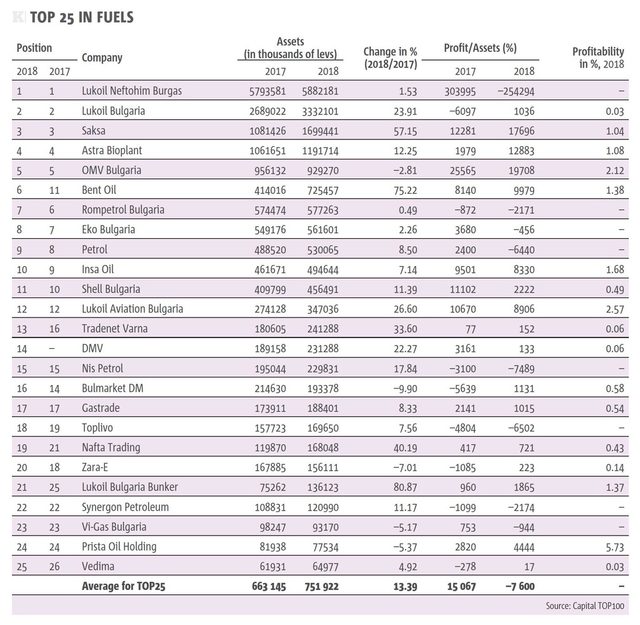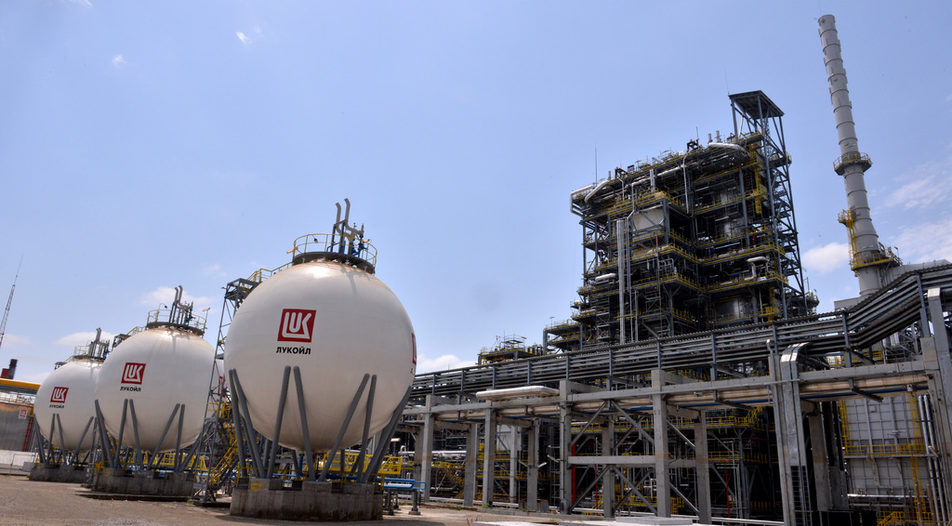- Lukoil's refinery in Burgas is gearing up for a switch to petrochemicals used in polymer production
For companies in the fuel sector, 2018 was a year of clashes and discord driven by the restructuring of the market. The process is still causing tremors and could lead to major shifts in the market positions of key players in the sector.
The industry is currently awaiting the adoption of new legislation introducing new financial guarantees for gas stations, requiring them to issue receipts displaying the profit margin of the sale. If the new legislation passes, it will hit smaller companies hard, probably opening the way for a new wave of consolidation among fuel retailers. The loss-making champion
The top 25 companies in the fuel sector in Bulgaria grew their revenue by 13.4% on average last year, mainly due to higher gas and diesel prices compared to 2017. However, it is difficult to paint a clear picture of the market, as some wholesalers reported sizeable revenue growth, while other players marked only insignificant increases. After two years of operating at a profit, the Lukoil Neftochim Burgas refinery once again reported a loss, this time the not inconsiderable sum of 254 million levs. The company explained the negative result by citing last year´s complete facility renovation which required a two-month suspension of operations. Last year, the refinery processed over 6 million tons of oil. This year, it plans to reach the 2017 - volume of 7 million tons. The average selling price of its products rose 10% last year due to higher international oil prices, according to the company´s annual report. Over the last ten years, Lukoil has gone through dynamic changes. At first, the focus was on the growing demand for diesel fuel and the refinery invested 1.5 billion euro in an installation for goudron hydrocracking, aiming to increase the production of light fuels. However, diesel prices have fallen, while there is an ever-increasing demand for fuels like propane and kerosene. For instance, the department in charge of jet fuel sales, Lukoil Aviation Bulgaria, reported revenue growth of 26%, while only 10% of the processed oil ends as kerosene. The most substantial revenue growth of all of Lukoil´s divisions - 80%, was recorded in Lukoil Bulgaria Bunker which is in charge of maritime fuel sales. In the future, petrochemistry will play an ever-growing role within oil processing, as demand for plastics grows in Bulgaria and the EU. Lukoil Neftochim Burgas recently announced plans to invest $400 million in a new capacity for polypropylene production. The company's business plan calls for the selection of a contractor by the end of the year, start of construction works in 2020-2021 and completion of the project by 2024.
The new unit will increase production capacity from 80,000 to 300,000 tons of polypropylene per year. Presently, the company manufactures three types of polypropylene, mainly for industrial application. The new production facility will widen the choice of polypropylene types to serve the food, construction and medical supply industries.
Year of clashes
The owner of Insa Oil, Georgi Samuilov, announced at the beginning of 2018 that he is leaving the Bulgarian Petroleum and Gas Association. The company, which owns a small refinery near the city of Plovdiv, is a significant player on the domestic wholesale fuel market. In 2018, Insa Oil reported revenue of nearly 500 million levs which places it in tenth place, and Samuilov's decision opened ruptures in the market.
Samuilov's official motive was the proposed new legislation that pits smaller fuel traders against their larger peers. The draft law has yet to be passed. Sources from the sector, however, explained that the reasons for the split were not exactly driven by Samuilov's defense of small operators but by Lukoil Bulgaria's 2018 decision to change its fuel distribution policies. Until that moment, about 10 to 15 companies had direct purchasing contracts with Lukoil Bulgaria. At the end of 2017, new minimum purchase requirements took effect, reducing the number of those companies to four - Litex, Bent Oil, Saksa and Insa Oil. Soon afterwards, Insa Oil discontinued its contract, left the oil and gas association, lashed out at the CEO of Lukoil Bulgaria, Valentin Zlatev, and reverted to its old practice of importing fuel by tankers. Sources detail that there were two reasons for the policy change. On the one hand, Mr Zlatev aimed to stop Insa Oil importing fuels. This would have made Lukoil Bulgaria the sole source of every significant quantity on the market and would have constituted a giant success for the Russian parent company. On the other, Samuilov expected to be the sole distributor but when it turned out that four companies will operate as wholesalers, doing business with Lukoil Bulgaria lost appeal for Insa Oil. Valentin Zlatev soon waded into another conflict. This time, he accused Kiril Domuschiev, chairman of the Confederation of the Employers and Industrialists in Bulgaria (CEIB) and owner of Nova TV, of conflict of interest. CEIB and Mr Domuschiev spoke out against the proposed fuel law which would have raised the bar for companies like Insa Oil. The reason? Insa Oil's tankers discharge at a Burgas port terminal owned by Domuschiev. Subsequently, the draft law was amended to eliminate all obstacles before smaller companies but its enactment was delayed. All in all, the Bulgarian Petroleum and Gas Association left CEIB. Then Russian national Bulat Subaev replaced Zlatev at the helm of Lukoil Bulgaria. Zlatev, who used to be the Bulgarian face of the Russian company for many years, now remains in a second-tier position in both Lukoil's wholesaler and refinery in Bulgaria.
During all these tremors, Bulgaria's competition regulator acted as usual: it audited the fuel sector for possible cartel agreements to calm the public disturbed by rising fuel prices. Then again, just as usual, the Commission for Protection of Competition announced in the spring that all is well in the sector and limited itself to recommendations regarding storage facilities. Lukoil's large distributors
The result of Lukoil's new wholesale policies can be seen in the revenue reported by the wholesalers - Saksa, Bent Oil and Litex.
Bent Oil's revenue jumped by 75% to 725 million levs last year. Saksa posted revenue of 1.7 billion levs, up 57%. Litex also reported a leap in revenue, to 949 million levs from 664 million levs in 2017. It is not present in the ranking of fuel companies because its activities are not focused solely on the oil business. None of these three companies can boast a great rise in profitability, with the margins of Bent Oil and Saksa remaining around the 1% mark. It seems that the more than considerable growth of sales hardly affects profitability. Lukoil Bulgaria's new manager, Bulat Subaev, has initiated a review of the company's commercial policy and as a result of it a wider group of companies will be able to purchase from Lukoil Bulgaria. What happened to the gas station chains?
In the context of average growth of 13% in the Top 25 group in the Bulgarian fuel sector, the fuel retail chains such as OMV, Eko, Petrol, Rompetrol and Shell fall short of that mark. OMV Bulgaria even recorded a drop. Once again, the explanation lies in the new wholesale policies, which determine a large portion of the retail chains' revenue. The biggest revenue jump was reported by Veselin Mareshki's Tradenet Varna, 33.6%, reaching 241 million levs. Even though Mareshki entered the National Assembly claiming that he would fight big companies and protect small firms, he kept fairly silent when the proposed new law was discussed in parliament. Lukoil Bulgaria, which is Mr Mareshki's main target, follows with a 24% increase. Another chain with above-average revenue growth is NIS Petrol with 17%, which is explained by the company's aggressive retail policies. However, they were not enough to improve its financial results and the company's losses more than doubled. Key deal on the horizon
A potential key event in the Bulgarian fuel sector is yet to happen. Former state-owned company Petrol, presently owned by Grisha Ganchev, is expected to be purchased by Insa Oil. What Insa Oil lacks is access to the final customer. If Insa Oil buys Petrol, the deal will have repercussions throughout the sector. Georgi Samuilov is expanding his business not only in the fuel sector. Insa Oil financed the purchase of Municipal Bank at the beginning of 2018. It acquired non-voting stocks by securing the 46 million levs that the newly created Novito Opportunities fund used to acquire the controlling 67.65% stake. The deal was finalized quickly, undisturbed by any of the regulatory bodies. Novito is usually associated with Delyan Peevski, an MP from the Movement for Rights and Freedoms party and media mogul. Mr Peevski is in the habit of lending his media firepower to his business partners and judging by the positive coverage of Mr Samuilov, they now work in tandem.

- Lukoil's refinery in Burgas is gearing up for a switch to petrochemicals used in polymer production
For companies in the fuel sector, 2018 was a year of clashes and discord driven by the restructuring of the market. The process is still causing tremors and could lead to major shifts in the market positions of key players in the sector.












